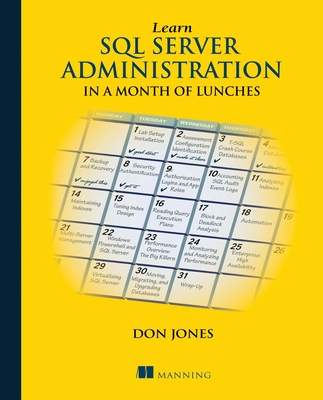
description
3Summary Learn SQL Server Administration in a Month of Lunches is the perfect way to get started with SQL Server operations, including maintenance, backup and recovery, high availability, and performance monitoring. In about an hour a day over a month, you'll learn exactly what you can do, and what you shouldn't touch. Most importantly, you'll learn the day-to-day tasks and techniques you need to keep SQL Server humming along smoothly. Purchase of the print book includes a free eBook in PDF, Kindle, and ePub formats from Manning Publications. About the Book Microsoft SQL Server is used by millions of businesses, ranging in size from Fortune 500s to small shops worldwide. Whether you're just getting started as a DBA, supporting a SQL Server-driven application, or you've been drafted by your office as the SQL Server admin, you do not need a thousand-page book to get up and running. Learn SQL Server Administration in a Month of Lunches is the perfect way to get started with SQL Server. This concise, easy-to-read book skips academic introductions and teaches you day-to-day techniques for maintenance, backup and recovery, performance monitoring, and more. Each of the 21 short lessons gives you practical takeaways you'll use over and over. What's Inside
About the Author Don Jones is a Microsoft MVP, speaker, and trainer. He is the creator of the Month of Lunches series and author of over 50 books on PowerShell, IIS, Active Directory, SCCM, SQL Server, and more. Table of Contents
- Master the basics--indexes, logins, backup, recovery ... and more
- Learn what you can and cannot do when supporting a third-party application
- Monitor and improve performance
- Written by expert trainer and bestselling author Don Jones
- Accessible to readers of any level of experience, the book covers techniques for all versions of SQLServer 2005-2014.
About the Author Don Jones is a Microsoft MVP, speaker, and trainer. He is the creator of the Month of Lunches series and author of over 50 books on PowerShell, IIS, Active Directory, SCCM, SQL Server, and more. Table of Contents
- Before you begin
- Server assessment and configuration
- T-SQL crash course
- Managing databases
- Backup and recovery
- Authentication: who are you?
- Authorization: what are you allowed to do?
- Accounting: what did you do?
- Analyzing indexes
- Maintaining indexes
- Tuning index designs
- Reading query execution plans
- Block and deadlock analysis
- Automating management with SQL Server Agent
- Multiserver management
- Windows PowerShell and SQL Server
- Using Extended Events
- Monitoring and analyzing performance
- Options for high availability
- Virtualizing SQL Server
- Moving, migrating, and upgrading databases
- SQL Server performance checklist
- Never the end
member goods
No member items were found under this heading.
Return Policy
All sales are final
Shipping
No special shipping considerations available.
Shipping fees determined at checkout.







